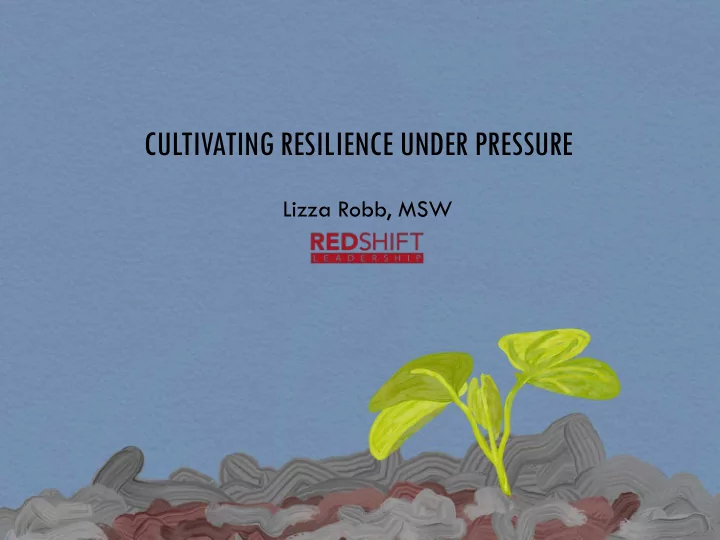

CULTIVATING RESILIENCE UNDER PRESSURE Lizza Robb, MSW
POP MODEL FOR PURPOSEFUL ACTION P urpose: Why is this important? Why is it a valuable use of my time and energy? O utcomes: What do I hope to accomplish? P rocess: How am I going to do it? The POP Model for purposeful action comes from Robert Gass’ s work through the Social Transformation Project
Source: David Rock and Daniel Siegel
SLEEP & EXERCISE Some Benefits of Exercise Some Benefits of Sleep rejuvenation enhanced learning and memory memory consolidation improved executive functions like response speed and working learning memory creative processing decreased stress and anxiety emotion regulation improved positive mood integration of experience augmented neuroplasticity
DOWNTIME LET YOUR MIND WANDER Downtime allows the brain to recover Facilitates insight (the Aha moment) Suggested downtime activities: Take a walk Take a hot shower Gaze out the window Listen to music Doodle
FLOW When we are in flow, we are: Completely involved Believe that our skills are adequate for the task Have a sense of serenity Experience a sense of timelessness Experience intrinsic motivation Source: Mihaly Csikszentmihalyi
BENEFITS OF FLOW more life engagement more life satisfaction more positive emotions more resources more self-esteem sleep-like benefits Source: Mihaly Csikszentmihalyi
FOCUS/FLOW IMMERSE YOURSELF Suggested activities: Set aside focus time each day during which you disconnect from email and phone. What time of day is your most productive for complex cognitive tasks? Try to schedule your focus time during that period. Engage in extracurricular activities that promote flow, such as music and art. Exercise your muscles around blocking out interferences and re-focusing sustained attention after distraction.
PLAY EXPERIMENT WITH JOY Reward centers in the brain light up when we are having fun, which activates the creation and consolidation of new neural pathways supporting creativity, long-term memory, and neuroplasticity. “Nothing lights up the brain like play.” In play, we: -Dr. Stuart Brown, National Institute of Play Decrease stress Strengthen relationships Enhance emotional flexibility in response to a perceived loss of control
CONNECTION Make time for people we love (or even like a lot) Express admiration and affection freely Take delight in the good fortune of others, and express it Right-size conflict, preserve the relationship, not your ego Forgive Share our inner lives with those we love Don’t gossip Engage in random acts of kindness
MINDFULNESS The awareness that comes from experiencing the present moment through your five senses non-judgmentally
“Between stimulus and response there is a space. In that space is our power to choose our response. In our response lies our growth and our freedom.” -Viktor Frankl
ONCE YOU KNOW WHAT MATTERS MOST… You can: Declutter (your closet, your calendar, your mind, your phone, your relationships, etc.) Say NO, because you know what you’re saying YES to Stop ruminating on what’s not important
SOURCES In addition to a synthesis of research, the topics covered today draw from the following sources: Authentic Happiness and Learned Optimism by Martin Seligman Becoming a Resonant Leader by Annie McKee, Richard Boyatzis and Fran Johnston Beyond Performance by Scott Keller The Culture Cycle by James L. Heskett The Emotional Life of Your Brain by Richard Davidson Flow by Mihaly Csikszeazntmihalyi Mindsight by Daniel Siegel The Myths of Happiness by Sonja Lyubomirsky Positivity by Barbara Fredrickson Primal Leadership by Daniel Goleman, Richard Boyatzis and Annie McKee Your Brain at Work by David Rock
Recommend
More recommend